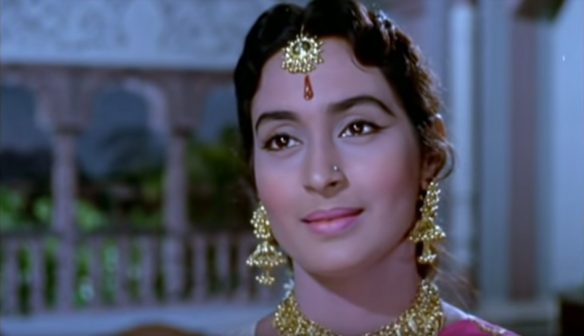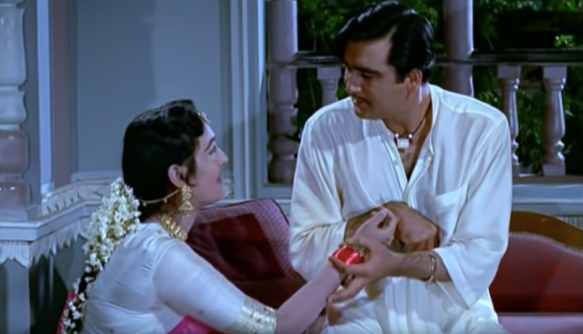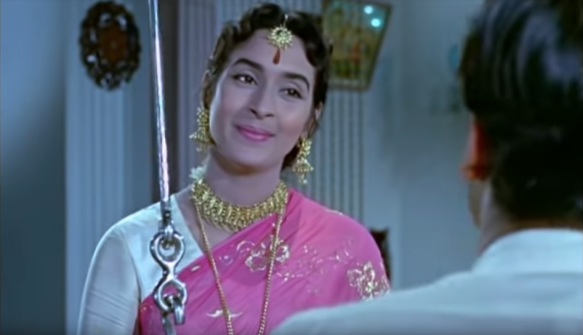
Nutan embodies the essence of an archetypal pativrata wife in Khandaan (1965)
Today, we present the lyrics and English translation to “Tum Hi Mere Mandir” from Khandaan (1965).
In light of the ongoing #MeToo movement that has now made its way to the echelons of Bollywood elite, perhaps this song was not the most timely choice. Let me be clear: I do not support the misogynistic undertones of husband-worshipping expressed in this song. I do, however, love this song for Ravi’s delicately crafted tune that has been rendered to perfection by Lata Mangeshkar in her all-time prime.
Viewed with modern eyes, Rajendra Krishan’s words can certainly be construed as misogynstic and downright cringeworthy. However, appreciating these lyrics in the context of the story depicted in Khandaan adds a bit of tempering nuance. In this film, Sunil Dutt plays a man with special needs who feels that he is not a worthy partner to his wife. To strengthen his spirit, the ever-graceful Nutan comforts him with a serenade of this lilting gem. The lyrics of “Tum Hi Mere Mandir” take on a more egalitarian meaning in this context: instead of espousing blind subservience, marital love is portrayed as a divine commitment that should not be weakened by judging our partners for their flaws and imperfections.
This iconic song took home some of the big prizes at the Filmfare Awards Ceremony of 1966. Ravi won Best Music Director, Rajendra Krishan won Best Lyricist, and Lata Mangeshkar received a well-deserved Best Singer award (her third of four total). I mean, it can’t just be my heart that skips a beat as Lata begins to hum that lullaby in the third stanza?
-Mr. ’55

Nutan comforts her husband Sunil Dutt with this iconic love song in Khandaan (1965)
Tum Hi Mere Mandir: Lyrics and English Translation
tum hii mere mandir, tum hii merii puujaa
You are my temple, you are my prayer.
tum hii devtaa ho
You are my God.
koii merii aa.nkho.n se dekhe to samjhe
If someone were to see through my eyes, they would understand
ki tum mere kyaa ho
what you mean to me.
jidhar dekhtii huu.n, udhar tum hii tum ho
Wherever I look, I see you and only you.
na jaane magar kin khayaalo.n me.n gum ho
But I do not know what thoughts you are lost in.
mujhe dekh kar tum zaraa muskuraa do
Show me a smile when you glance at me,
nahii.n to mai.n samjhuungii mujh se khafaa ho
or else I will think that you are angry with me.
tum hii mere maathe kii bindiyaa kii jhilmil
You are the sparkle of the bindi on my forehead.
tum hii mere haatho.n ke gajaro.n kii manzil
You are the destination of the flower garlands in my hands.
mai.n huu.n ik chhotii-sii maaTii kii guDiyaa
I am just a little clay doll.
tum hii praaN mere, tum hii aatmaa ho
You are my life, you are my soul.
bahut raat biitii chalo mai.n sulaaa duu.n
It is late in the night; come, let me put you to sleep.
pavan chheDe sargam, mai.n lorii sunaa duu.n, mmmm….
The wind carries a tune, while I sing you a lullaby.
tumhe.n dekh kar yeh khayaal aa rahaa hai
When I look at you, I feel that I am watching
ki jaise farishtaa koii so rahaa ho
an angel in peaceful slumber.
tum hii mere mandir, tum hii merii puujaa
You are my temple, you are my prayer.
tum hii devtaa ho
You are my God.
Glossary
mandir: temple; puujaa: prayer; devtaa: God; gum: lost; muskuraanaa: to smile; khafaa: angry; bindiyaa: decorative mark worn in middle of forehead by Indian women; jhilmil: sparkle; gajraa: flower garland; manzil: destination; maaTii: clay; guDiyaa: doll; praaN: life; aatmaa: soul; sulaanaa: to put to sleep; pavan: breeze, wind; sargam: melody, tune; lorii: lullaby; farishtaa: angel.

Nutan serenades Sunil Dutt on a casual bedroom jhoola in Khandaan (1965).
